Thì quá khứ đơn (Past Simple) là một trong những thì cơ bản và là chủ điểm ngữ pháp không thể thiếu đối với bất kỳ người học tiếng Anh nào. Bài viết này sẽ tổng hợp toàn bộ kiến thức về công thức, cách dùng, dấu hiệu nhận biết của thì quá khứ đơn, cùng với các bài luyện tập có đáp án để giúp bạn nắm vững kiến thức một cách hiệu quả.
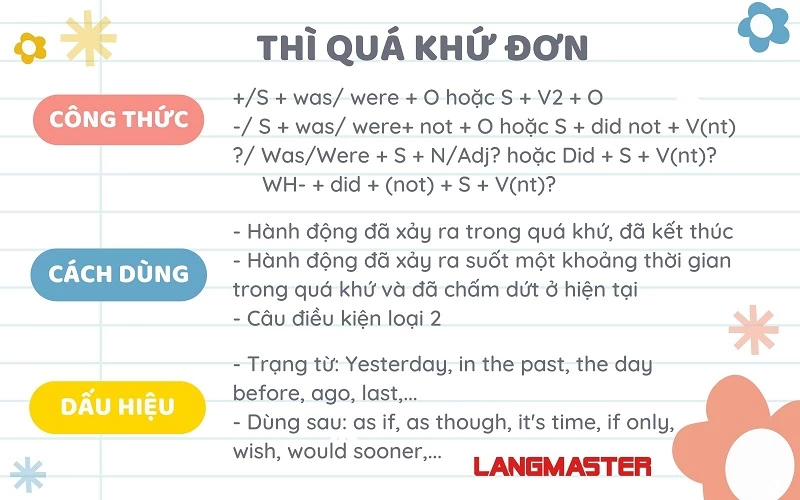
1. Khái niệm thì quá khứ đơn (Past Simple hay Simple Past)
Thì quá khứ đơn (Past Simple hay Simple Past) trong tiếng Anh được sử dụng để diễn tả một hành động, sự việc đã xảy ra và kết thúc hoàn toàn trong quá khứ. Nó cũng có thể diễn tả những hành động, sự việc vừa mới kết thúc trong quá khứ.
Ví dụ:
- She went to school yesterday. (Hôm qua cô ấy đã đi học.)
- Mary didn’t come to the company last week. (Tuần trước Mary đã không đến công ty.)
- I traveled to China two years ago. (Tôi đã tới Trung Quốc vào 2 năm về trước)
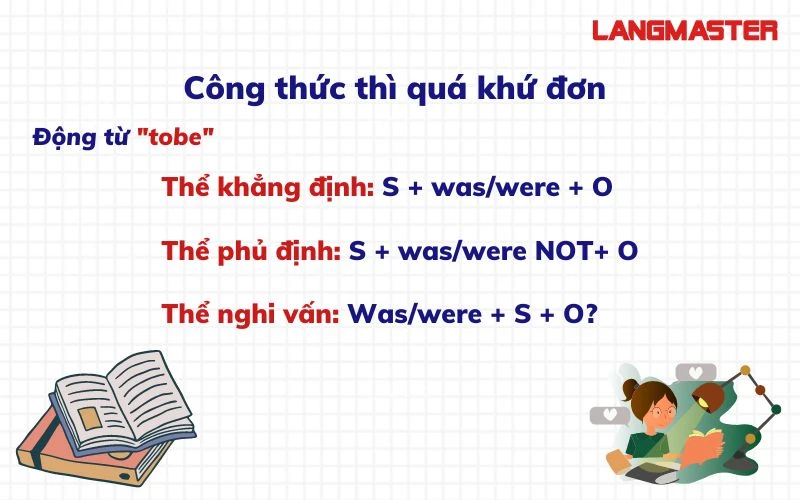
2. Công thức thì quá khứ đơn (Past Simple)
Công thức thì quá khứ đơn được chia làm 2 phần chính: cấu trúc với động từ “to be” và cấu trúc với động từ thường. Mỗi cấu trúc lại bao gồm 3 dạng: khẳng định, phủ định và nghi vấn.
2.1. Thì quá khứ đơn với “to be”
Câu khẳng định
S + was/ were + O
Trong đó:
- He/She/It/Danh từ số ít/ Danh từ không đếm được + was
- I/We/You/They/ Danh từ số nhiều + were
Ví dụ:
- My phone was broken yesterday. (Chiếc điện thoại của tôi đã bị hư ngày hôm qua.)
- We were in DaLat on our summer vacation last week. (Chúng tôi đã ở Đà Lạt trong kỳ nghỉ hè tuần trước.)
- I was a student last year. Now I am working for a company. (Tôi đã là một học sinh từ năm ngoái rồi. Giờ tôi đang làm cho một công ty)
Câu phủ định
S + was/ were + not + O
Ví dụ:
- Helen wasn’t happy yesterday because she didn’t pass the exam. (Hôm qua cô ấy không vui vì cô ấy không đậu kỳ thi.)
- I was not you so I didn’t decide. (Tôi không phải bạn nên tôi không thể quyết định được)
- He wasn’t angry with you. (Anh ấy đã không tức giận với bạn)
Câu nghi vấn
Câu hỏi: Was/Were + S + N/Adj?
Câu trả lời: Yes, S + was/were. / No, S + wasn’t/weren’t.
Ví dụ:
- Was Helen the first to sign up for this course? (Helen có phải là người đầu tiên đăng ký khóa học này không?)
- Were you angry? (Bạn đã tức giận à?)
- Was he a dentist last year? (Anh ta đã làm nha sĩ vào năm ngoái à?)
- Câu trả lời: Yes, she/he was.
2.2. Thì quá khứ đơn với động từ thường
Câu khẳng định
S + V2 + O
Ví dụ:
- My family went to Sapa last month. (Gia đình tôi đã đi Sapa vào tháng trước.)
- I met him in an English class yesterday. (Tôi đã gặp anh ấy trong một lớp học tiếng Anh ngày hôm qua.)
- She went to the hospital last week. (Cô ấy đã đến bệnh viện từ tuần trước)
Câu phủ định
S + did not + V (nguyên thể) + O
Ví dụ:
- I didn’t go to the party last night. (Tôi đã không đến buổi tiệc tối hôm qua.)
- We didn’t accept their offer. (Chúng tôi đã không đồng ý đề nghị của họ)
- She didn’t show me the password to her computer. (Cô ấy đã không cho tôi xem mật khẩu của máy tính)
Câu nghi vấn
Câu hỏi: Did (not) + S + V (nguyên thể) + O?
Câu trả lời: Yes, S + did. / No, S + didn’t.
Ví dụ:
- Did you go to the party last night? (Bạn có đến buổi tiệc tối hôm qua không?)
- Did you bring my key? (Bạn đã cầm chìa khóa của tôi đúng không?)

3. Cách dùng thì quá khứ đơn (Past Simple)
Thì quá khứ đơn được sử dụng trong nhiều trường hợp khác nhau để diễn tả các sự kiện trong quá khứ:
3.1. Diễn tả một hành động đã xảy ra trong quá khứ, đã kết thúc rồi và biết rõ thời gian.
Ví dụ:
- Mary went to Vietnam last summer. (Mary đến Việt Nam vào mùa hè năm ngoái.)
- I worked at MN company two years ago. (Tôi đã làm việc cho công ty MN 2 năm trước)
- My family went to the beach last summer. (Gia đình tôi đã đi biển vào mùa hè trước)
3.2. Diễn tả một hành động đã xảy ra liên tiếp trong suốt một khoảng thời gian trong quá khứ nhưng hiện tại đã hoàn toàn chấm dứt.
Ví dụ:
- She worked as a teacher for six years before her marriage. (Cô ấy đã làm giáo viên trong vòng 6 năm trước khi kết hôn.)
- I visited my grandma every month when I was not married. (Tôi tới thăm bà vào mỗi tháng trước khi tôi kết hôn)
- I worked about 10 hours a day before I was sick. (Tôi đã làm việc 10 tiếng mỗi ngày trước khi tôi bị ốm)
3.3. Diễn tả 1 hành động xen vào 1 hành động khác trong quá khứ.
Ví dụ:
- When we were having dinner, the phone rang. (Khi chúng tôi đang ăn tối thì chuông reo.)
- When he came home I was reading a book. (Khi anh ta về nhà thì tôi đang đọc một quyển sách)
- She cried when she was watching a movie. (Cô ấy đã bật khóc khi đang xem một bộ phim)
3.4. Được sử dụng trong câu điều kiện loại 2
Ví dụ:
- If I were him, I would be so happy. (Nếu tôi là anh ấy, tôi sẽ rất hạnh phúc.)
- If I were you, I would bring my key before going out. (Nếu tôi là bạn, tôi sẽ cầm theo chìa khóa của mình trước khi ra ngoài)
- If I were her, I would be married with Tom because he is very rich. (Nếu tôi là cô ấy, tôi sẽ lấy Tom bởi vì anh ta rất giàu có)
3.5. Dùng trong câu ước không có thật ở hiện tại.
Ví dụ:
- I wish I were in Vietnam now. (Tôi ước giờ tôi đang ở Việt Nam)
- I wish I had a lot of money. (Tôi ước tôi có thật nhiều tiền)
- I wish I saw you at the party last night. (Tôi ước tôi nhìn thấy bạn trong bữa tiệc đêm qua)
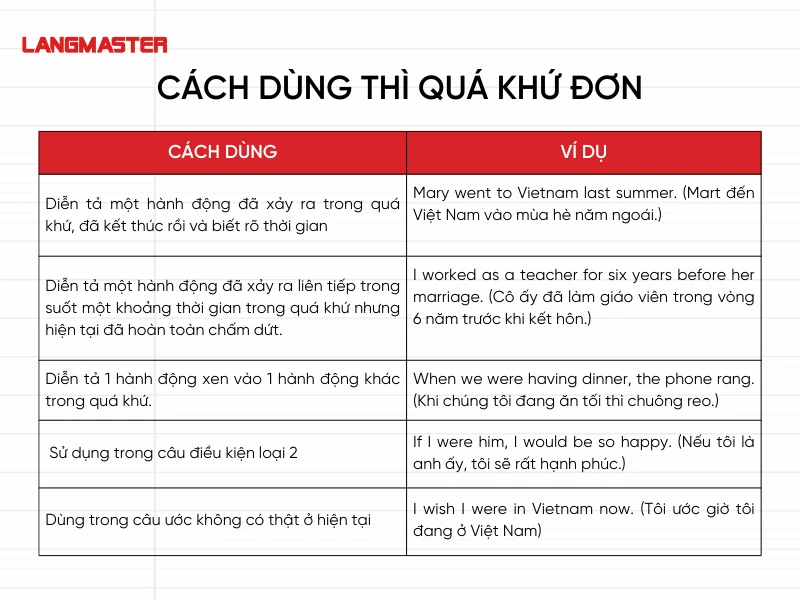
4. Cách chia động từ thì quá khứ đơn
Việc chia động từ trong thì quá khứ đơn được thực hiện như sau:
4.1. Đối với động từ “to be”
- Was: Dùng với các ngôi thứ nhất số ít, ngôi thứ ba số ít (I, he, she, it).
- Were: Dùng với các ngôi thứ nhất số nhiều, ngôi thứ hai, ngôi thứ ba số nhiều (We, you, they).
4.2. Đối với động từ thường (V2)
Động từ có quy tắc (Regular verbs)
Ta thêm “ed” vào đuôi động từ:
- want -> wanted
- turn -> turned
Thêm “d” vào những động từ đã có tận cùng là “e”:
- Agree -> Agreed
- smile -> smiled
Động từ tận cùng bằng “y” và trước nó là một phụ âm, ta chuyển “y” thành “i” rồi thêm “ed”:
- study -> studied
- cry -> cried
Động từ bất quy tắc (Irregular verbs)
Ở thì quá khứ đơn, ngoài các động từ thêm đuôi -ed, có những động từ không theo quy tắc. Bạn cần học thuộc các động từ bất quy tắc này. Dưới đây là một số ví dụ:
| Động từ (nguyên thể) | Thể quá khứ đơn (V2) | Nghĩa |
|---|---|---|
| Begin | Began | Bắt đầu |
| Come | Came | Đi đến |
| Do | Did | Làm |
| Eat | Ate | Ăn |
| Find | Found | Tìm thấy |
| Give | Gave | Cho |
| Have | Had | Có |
| Keep | Kept | Giữ |
| Leave | Left | Ra đi |
| Meet | Met | Gặp mặt |
| Pay | Paid | Trả |
| Read | Read | Đọc |
| Sing | Sang | Ca hát |
Bạn có thể xem bảng 360 động từ bất quy tắc đầy đủ để tham khảo thêm.
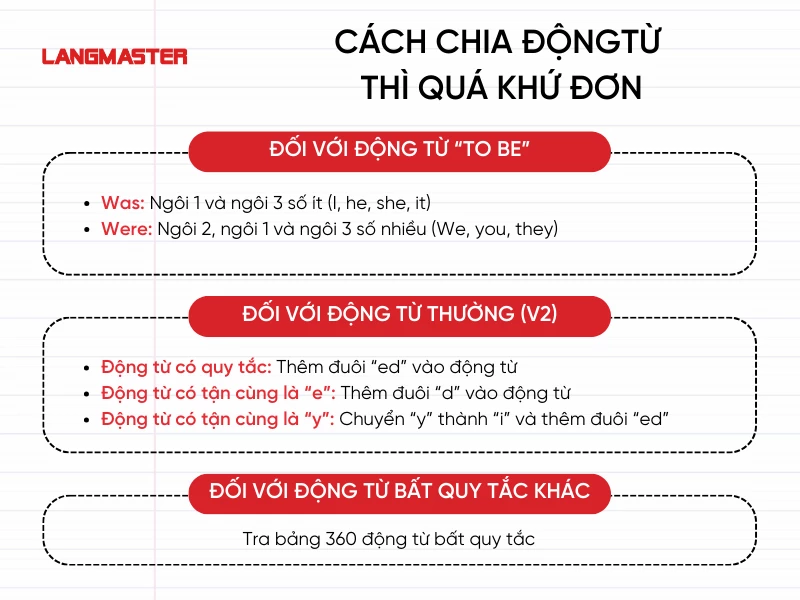
5. Dấu hiệu nhận biết thì quá khứ đơn
Để nhận biết thì quá khứ đơn, chúng ta có thể dựa vào những dấu hiệu sau:
- Trong câu có các trạng từ chỉ thời gian trong quá khứ như: yesterday, in the past, the day before, ago, last (week, year, month) hoặc những khoảng thời gian đã qua trong ngày (this morning, this afternoon – khi hành động đã kết thúc).
- Sau các cấu trúc: as if, as though (như thể là), it’s time (đã đến lúc), if only, wish (ước gì), would sooner/ rather (thích hơn).
- Trong một số cấu trúc nhất định: It’s + (high) time + S + Ved, It + is + khoảng thời gian + since + thì quá khứ, câu điều kiện loại 2,…
Ví dụ:
- I didn’t go to school yesterday because of the heavy rain. (Tôi đã không tới trường vào ngày hôm qua vì mưa rất to)
- The plane took off an hour ago. (Cái máy bay đã cất cánh được 1 giờ rồi)
- It is high time I started to learn English seriously. (Đã đến lúc tôi phải bắt đầu học tiếng Anh một cách nghiêm túc rồi.)
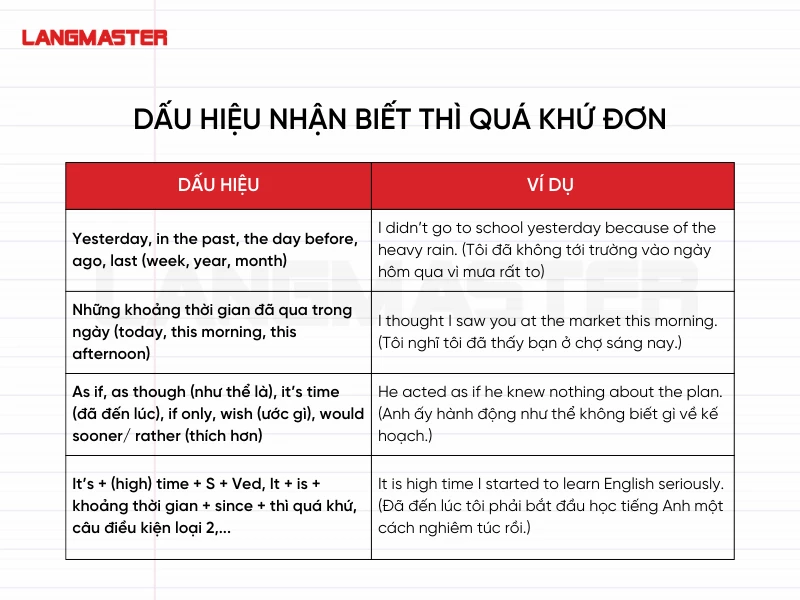
6. 20 câu ví dụ về thì quá khứ đơn
Dưới đây là một số ví dụ minh họa cho thì quá khứ đơn:
- I visited Paris last summer. (Hồi hè năm ngoái, tôi đã thăm Paris.)
- She completed her project yesterday. (Ngày hôm qua, cô ấy đã hoàn thành dự án của mình.)
- They lived in London for five years. (Họ đã sống ở London trong năm năm.)
- He bought a new car in 2019. (Anh ấy đã mua một chiếc xe mới vào năm 2019.)
- We studied together in college. (Chúng ta đã học chung ở đại học.)
- I cleaned my room yesterday morning. (Tôi đã dọn dẹp phòng vào sáng hôm qua.)
- He bought a new car last month. (Anh ấy đã mua một chiếc xe hơi mới tháng trước.)
- She ate sushi for dinner last night. (Cô ấy đã ăn sushi cho bữa tối tối qua.)
- They played soccer in the park yesterday. (Họ đã chơi bóng đá ở công viên vào ngày hôm qua.)
- We visited the museum last weekend. (Chúng tôi đã thăm bảo tàng cuối tuần trước.)
- She didn’t enjoy the movie last night. (Cô ấy không thích bộ phim tối qua.)
- They didn’t travel to Asia last year. (Họ không đi du lịch châu Á năm ngoái.)
- He never visited that museum. (Anh ấy chưa bao giờ thăm bảo tàng đó.)
- We didn’t meet at the party. (Chúng ta không gặp nhau ở bữa tiệc.)
- The concert didn’t start on time. (Buổi hòa nhạc không bắt đầu đúng giờ.)
- Did you see the new movie? (Bạn đã xem bộ phim mới chưa?)
- Were they at the event last week? (Họ có ở sự kiện tuần trước không?)
- Did she finish her homework? (Cô ấy đã hoàn thành bài tập về nhà chưa?)
- Was it raining when you left? (Có mưa khi bạn rời đi không?)
- Did they enjoy the concert? (Họ có thích buổi hòa nhạc không?)
7. Các dạng bài tập thì quá khứ đơn và đáp án
Để củng cố những kiến thức đã học, dưới đây là một số dạng bài tập thực hành về thì quá khứ đơn kèm đáp án.
7.1. Bài tập
Bài tập 1: Chia các động từ để hoàn thành câu
Yesterday, he (go)______ to the hotel with a client. They (drive) ______ around the parking lot for an hour to find a parking space. When I (arrive) ______ at the restaurant, the place (be) ______ full. The waitress (ask) ______ me if I (have) _______ reservations. She (say) _______, “No, my secretary forgets to make them.” The waitress (tell)______ me to come back in 4 hours. Her client and she slowly (walk) ______ back to the car. Then they (see) ______ a big grocery store. I (stop) _______ in the grocery store and (buy) ______ some sandwiches. That (be) ______ better than waiting for two hours.
Bài tập 2: Chia động từ để hoàn thành đoạn văn
On Saturday, the children ___ (talk) about a day out together in the country. The next morning, they ____(go) to the country with their 3 dogs and ___ (play) together. Lam and Dan ___ (have) some kites. Sometime later the dogs ____ (be) not there. So they ___ (call) them and ____ (look) for them in the forest. After half an hour the children ____ (find) them and ___ (take) them back. Chi ___ (be) very happy to see them again. At lunchtime, Lam ___ (go) to the bikes and ___ (fetch) the basket with some meat sandwiches. Then they ___ (play) baseball. Lam and Dan ____ (win). In the evening, they ___ (ride) home.
Bài tập 3: Dùng những từ gợi ý dưới đây để hoàn thành câu
- She/ go swimming/ yesterday.
- => ________________________________
- He/ wash/ the dishes.
- => ________________________________
- His mother/ go shopping/ with/ friends/ in/ park.
- => ________________________________
- I/ cook/ chicken noodles/ lunch.
- => ________________________________
- She/ I/ study/ hard/ last month.
- => ________________________________
- my dad/ play/ golf/ yesterday.
- => ________________________________
- last night/ I/listen/ music/ for 2 hours.
- => ________________________________
- We/ have/ nice/ weekend.
- => ________________________________
- I/ go/ supermarket /yesterday.
- => ____________________________ ____
- We/ not go/ school last week.
- => ________________________________
Bài tập 4: Trắc nghiệm tổng hợp, khoanh vào đáp án đúng nhất
- He ___________ more than 60 pieces of music.
A. writes B. wrote C. writed D. was wrote - They _______ him in town a few days ago.
A. did see B. was saw C. did saw D. saw - It was cool, so I _____________ the window.
A. shut B. was shut C. am shut D. shutted - I ___________ to the hospital three times last week.
A. was go B. went C. did go D. goed - What __________ you _________ last summer vacation?
A. were / do B. did / did C. did / do D. do / did - The police ___________ me on my way home last week.
A. was stop B. stopped C. stops D. stopping - The film is very boring. I _____________ it very much.
A. enjoyed B. wasn’t enjoy C. didn’t enjoyed D. didn’t enjoy - The room was very uncomfortable. I ____________ stay very well.
A. didn’t B. did C. wasn’t D. not - The window was open and a bird ___________ into the room.
A. fly B. flew C. was flew D. did fly - Lam __________ a lot of money last night. She __________ an expensive dress.
A. spend / buy B. spent / buy C. spent / bought D. was spent / bought
Bài tập 5: Chuyển những câu sau sang dạng phủ định và nghi vấn khi sử dụng thì quá khứ đơn
- I wrote an essay in math class this morning.
- She watched TV yesterday morning.
- He and you were in the English club last Monday.
- They ate noodles an hour ago.
- We always had a nice time on the Christmas holiday in the past.
- My mom decorated the Christmas tree.
- She bought a new shirt yesterday.
- We were late for school.
- He took his children to the museum last weekend.
- I made a cushion for my armchair.
Bài tập 6: Viết lại các câu sau và sử dụng thì quá khứ đơn.
- She goes to the swimming pool because she likes swimming.
- We have dinner at 8 pm.
- She eats too many sweets.
- He buys the newspaper in the shop.
- They get up at six and go to school
- Does he buy the newspaper in the shop over there?
- Do you do your homework in the morning?
- Do we have a good holiday?
- Do you find any animals in the forest?
- Is it dark when he gets up in the morning?
Bài tập 7: Chọn was hoặc were để điền vào chỗ trống.
- She………very intelligent.
- I………at home yesterday.
- The dog………in the garden.
- They………in Da Nang last month.
- He………at school yesterday.
Bài tập 8: Chia động từ sao cho phù hợp
- What he ………(do) last night? – He……… (do) his homework.
- My elder brother………(not/use) the computer yesterday.
- He……… (live) in Da Nang.
- Jim ……… (read) the magazine last month.
- She ……… (forget) something?

7.2. Đáp án
Bài tập 1:
Yesterday, he went to the hotel with a client. They drove around the parking lot for an hour to find a parking space. When I arrived at the restaurant, the place was full. The waitress asked me if I had reservations. She said, “No, my secretary forgets to make them.” The waitress told me to come back in 4 hours. Her client and she slowly walked back to the car. Then they saw a big grocery store. I stopped in the grocery store and bought some sandwiches. That was better than waiting for two hours.
Bài tập 2:
On Saturday, the children talked about a day out together in the country. The next morning, they went to the country with their 3 dogs and played together. Lam and Dan had some kites. Sometime later the dogs were not there. So they called them and looked for them in the forest. After half an hour the children found them and took them back. Chi was very happy to see them again. At lunchtime, Lam went to the bikes and fetched the basket with some meat sandwiches. Then they played baseball. Lam and Dan won. In the evening, they rode home.
Bài tập 3:
- She went swimming yesterday.
- He washed the dishes.
- His mother went shopping with her friends in the park.
- I cooked chicken noodles for lunch.
- She and I studied hard last month.
- My dad played golf yesterday.
- Last night, I listened to music for 2 hours.
- We had a nice weekend.
- I went to the supermarket yesterday.
- We didn’t go to school last week.
Bài tập 4:
- B (wrote)
- D (saw)
- A (shut)
- B (went)
- C (did / do)
- B (stopped)
- D (didn’t enjoy)
- A (didn’t)
- B (flew)
- C (spent / bought)
Bài tập 5:
- Did I write an essay in math class this morning? / I didn’t write an essay in math class this morning.
- Did she watch TV yesterday morning? / She didn’t watch TV yesterday morning.
- Were he and you in the English club last Monday? / He and you weren’t in the English club last Monday.
- Did they eat noodles an hour ago? / They didn’t eat noodles an hour ago.
- Did we always have a nice time on the Christmas holiday in the past? / We didn’t always have a nice time on the Christmas holiday in the past.
- Did your mom decorate the Christmas tree? / My mom didn’t decorate the Christmas tree.
- Did she buy a new shirt yesterday? / She didn’t buy a new shirt yesterday.
- Were we late for school? / We weren’t late for school.
- Did he take his children to the museum last weekend? / He didn’t take his children to the museum last weekend.
- Did I make a cushion for my armchair? / I didn’t make a cushion for my armchair.
Bài tập 6:
- She went to the swimming pool because she liked swimming.
- We had dinner at 8 pm.
- She ate too many sweets.
- He bought the newspaper in the shop.
- They got up at six and went to school.
- Did he buy the newspaper in the shop over there?
- Did you do your homework in the morning?
- Did we have a good holiday?
- Did you find any animals in the forest?
- Was it dark when he got up in the morning?
Bài tập 7:
- She was very intelligent.
- I was at home yesterday.
- The dog was in the garden.
- They were in Da Nang last month.
- He was at school yesterday.
Bài tập 8:
- What he did last night? – He did his homework.
- My elder brother didn’t use the computer yesterday.
- He lived in Da Nang.
- Jim read the magazine last month.
- She forgot something?
Kết luận
Bài viết đã tổng hợp toàn bộ kiến thức cần nhớ về thì quá khứ đơn (Past Simple), bao gồm khái niệm, công thức, cách dùng, cách chia động từ và dấu hiệu nhận biết. Việc nắm vững các lý thuyết cơ bản này sẽ giúp bạn sử dụng thì quá khứ đơn một cách chính xác và tự tin.
Tóm tắt kiến thức chính:
- Dấu hiệu nhận biết: Trong câu có các trạng từ chỉ thời gian như: yesterday, in the past, ago, last (week, year, month),… hoặc các cụm như: as if, as though, would rather, It’s high time,…
- Công thức thì quá khứ đơn:
- Thể khẳng định: S + was/ were +… hoặc S + V2/ed +…
- Thể phủ định: S + was/ were + not + … hoặc S + did not + V (nguyên thể)
- Thể nghi vấn (Yes/No): Was/ Were + S +…? hoặc Did + S + V (nguyên thể)?
- Câu hỏi Wh-: Wh-word + was/ were + S (+ not) +…? hoặc Wh-word + did + S + (not) + V (nguyên thể)?

